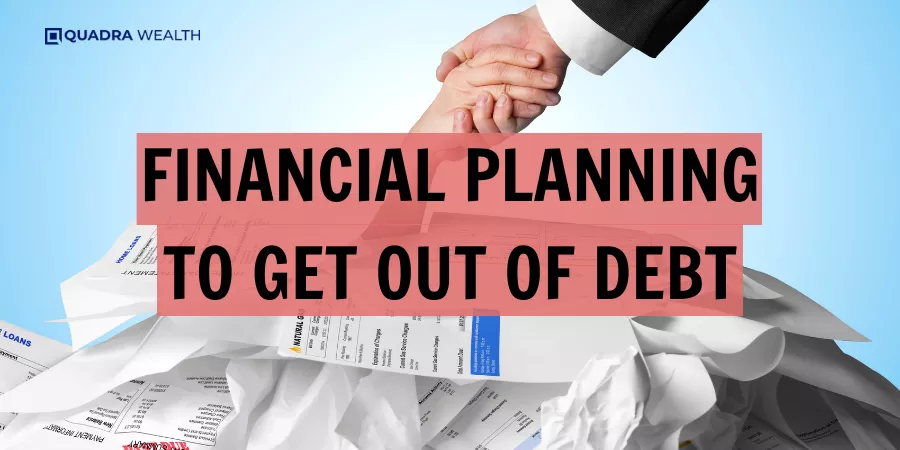Getting out of debt can feel like a mountain that’s impossible to climb. Did you know that a financial advisor can help you create a clear path to conquer this financial peak? This blog post will guide you through effective strategies and tips for tackling your debts head-on, with or without professional help.
Read on and empower yourself to achieve financial freedom!
Key takeaways
● Know all about your debt. List them down and check the interest rates.
● Make a long-term plan for debt repayment. Try to pay more than the minimum amount each month.
● Financial advisors can help manage your debt. They make a plan based on your needs.
● Try methods like Debt Snowball or refinancing to get out of debt fast. Use any extra money you have towards paying off your debts.
● You can renegotiate with credit card companies to lower what you owe.
● Some financial advisors charge by hour or flat fees while others get paid from sales or asset percentages.
Understanding Debt and Its Impact
Having debt can affect your life in several ways including damaging your credit score, leading to high interest rates and delinquent accounts. It’s vital to understand the negative implications of carrying substantial debt, such as restricted financial control and increased borrowing costs.
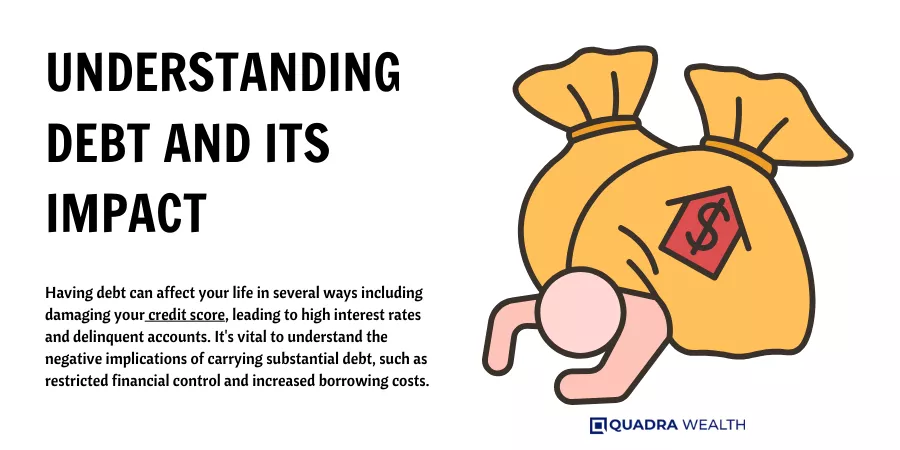
How Debts Affect Your Credit Score
Having a lot of debt can lower your credit score. This is because how much you owe makes up 30% of your score. If you borrow too much, lenders may think you can’t pay back what you owe.
Paying only the minimum on cards also hurts scores. It shows slow repayment and adds to total debt. Also, late or missed payments are bad for scores as well. They stay on your report for seven years! So, try to pay all bills on time and keep debts low to help keep a good credit score.
The Negative Implications of Debt
Debt can hurt your life in many ways. It makes it hard to save money or reach goals like buying a house. High interest rates make the debt grow fast. This means more money goes toward paying off debt than anything else.
Also, owing too much can lower your credit score. A bad credit score may stop you from getting a job or an apartment. It can also lead to higher costs for things like car insurance and cell phone plans.
Lastly, being in debt can cause stress and worry about how to pay bills each month.
Importance of Financial Planning for Debt Management
The right financial planning plays a vital role in managing debt. It involves analyzing and restructuring debts to make them more manageable. This process also includes creating a long-term plan tailored to individual income, expenses, and life goals.
Fundamental knowledge of budgeting, understanding interest rates, and taking control of spending habits are essential for a successful financial plan. A properly structured financial plan helps eliminate high-interest-rate debts initially while preventing the accumulation of future debt.
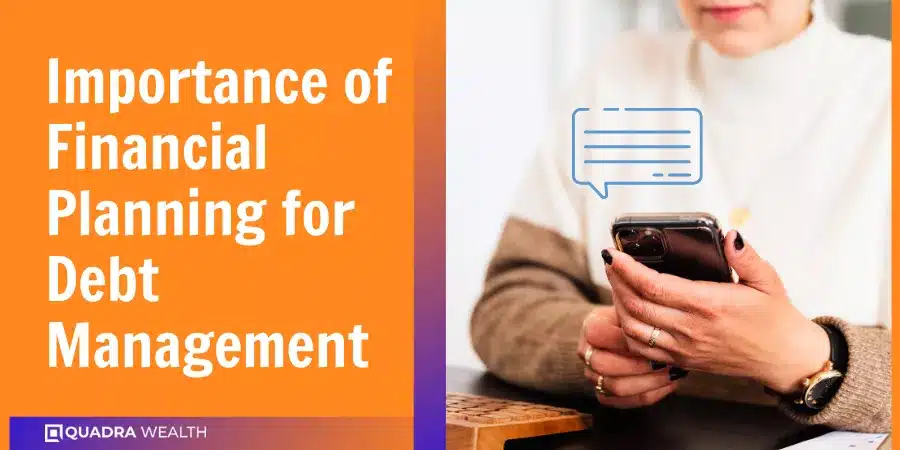
Analyzing and Restructuring Debts
Knowing your debt is the first step in getting out of it. Here are some steps to analyze and restructure your debts:
- List all your debts. Write down every place you owe money.
- Check the interest rates for each debt. High-interest rates cost more money over time.
- Look at your credit score. It tells how well you handle money.
- Prioritize your debts. Start with the ones that cost the most in interest, as stated in Important Fact number 2.
- Talk to a financial advisor about your debt plan, as stated in Important Fact number 1.
- Think about debt restructuring and consolidation options. A home equity loan can help pay off credit card balances as mentioned in Important Fact number 6.
- Share important papers with your advisor, such as bank statements or tax returns, as per Important Fact number 5.
- Choose a certified financial planner (CFP) as an advisor for help, as noted in Important Fact number 3.
Creating a Long-Term Plan
Creating a long-term plan is key to paying off debt. This is how you do it:
- Begin with the end goal in mind. Think of where you want to be after ten years.
- Write down all your debts. Include what you owe, who you owe, and the interest rates.
- Sort your debts from the highest to the lowest interest rate.
- Make a plan to pay off the debt with the highest interest rate first. This helps save money on interest.
- Find ways to make more money or spend less money.
- Put this extra money towards paying off your debt.
- Keep going until all your debt is paid off.
Strategies to Get Out Of Debt
A successful strategy against debt involves making greater payments than the bare minimum required. Consider adopting the proven Debt Snowball Method to systematically pay off your debts.
Refinancing could be another effective approach that helps in lowering interest rates on outstanding loans. Receiving an unexpected financial windfall? Direct it towards paying down your debt! Renegotiating credit card debts with your issuer can sometimes result in better repayment terms, providing relief from overwhelming bills.
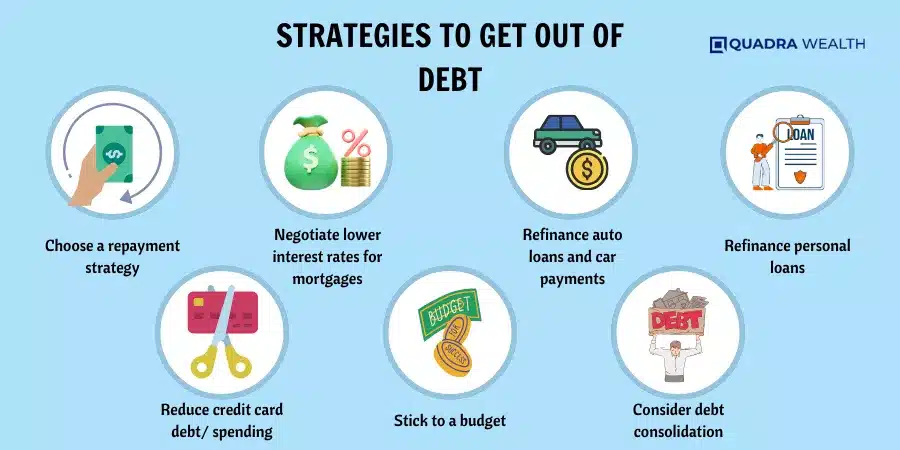
Paying More than the Minimum Payment
Paying more than the minimum each month is a smart move. If you only pay the lowest amount, it takes longer to clear your debt. You also pay more money in interest fees. By paying extra, you lower your debt faster.
This can boost your credit score and save you cash in the end. It’s one good way to get out of debt quickly!
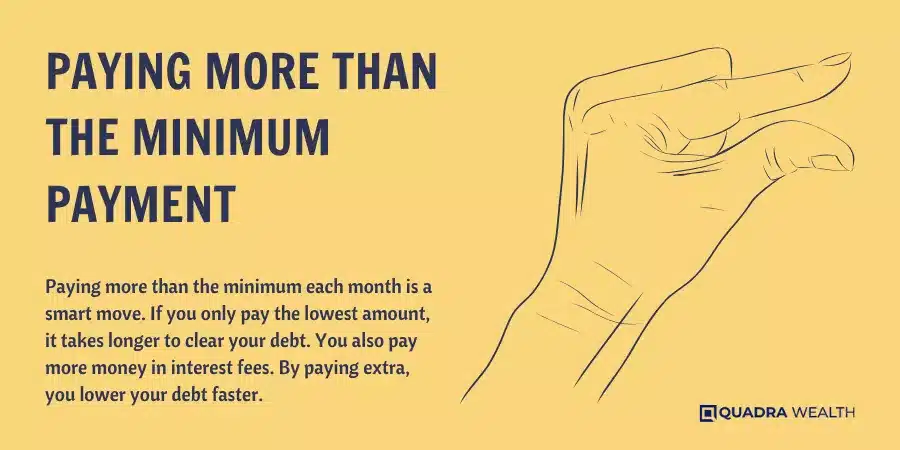
Try the Debt Snowball Method
You can use the Debt Snowball Method to pay off your debt. First, clear your smallest debts. After that, target bigger ones. This plan helps you feel good as you see debts go away one by one.
It pushes you to keep going with the plan. If this feels too hard to do on your own, a financial advisor can help set up and stick to the plan. Using this method often leads people out of debt and into a better place with their money.
Refinancing Debt
Refinancing debt is a good way to get out of debt. It can help you pay less over time. A financial advisor may suggest this plan. They can find the best ways for you to refinance. This could be with lower interest rates or faster payoff times.
One option might be to use a home equity loan to restructure and group all of your debt together. This is called consolidating your debt. But remember, different debts need different plans! You might want to focus on paying off high-interest accounts first, or any that are past due.
With the help of a financial advisor, you can set up a long-term plan that fits just right for you!
Commit windfalls to debt
Use any extra cash you get to pay off your debt. This extra money can be from a work bonus, tax refund, or from selling things you don’t need anymore. Putting this money on your debt can make it go away faster.
The more money you put towards your debt, the less time it will take to pay off. You also save on interest fees when you do this. Always aim for debts with high-interest rates first.
In doing so, you lower how much you owe quicker and boost your credit score too.
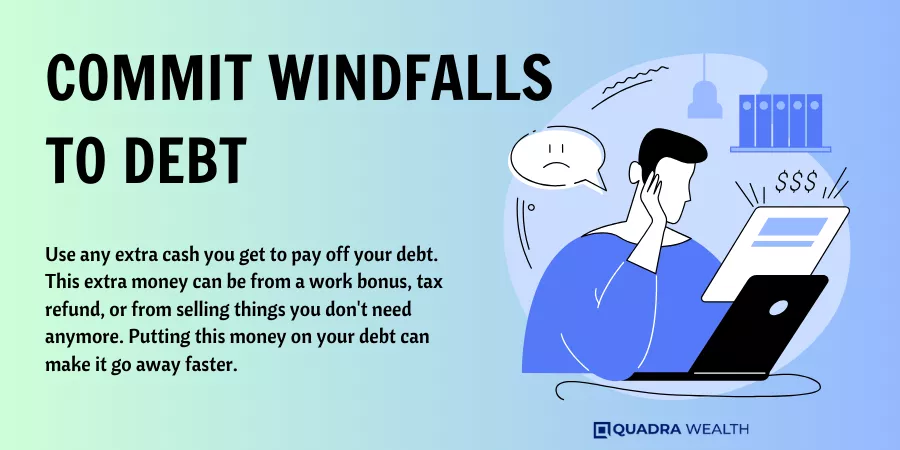
Renegotiating Credit Card Debt
You can chat with your credit card company to lower your debt. This is called renegotiating credit card debt. First, you ask them to lessen the money they charge for using their card.
This is known as an interest rate. If they say yes, it can help you save cash every month. You might also ask them if they can forget about some of the fees or lower them that they have charged you for being late on a payment or going over your limit.
It’s good for both parties because it makes paying back easier and faster.
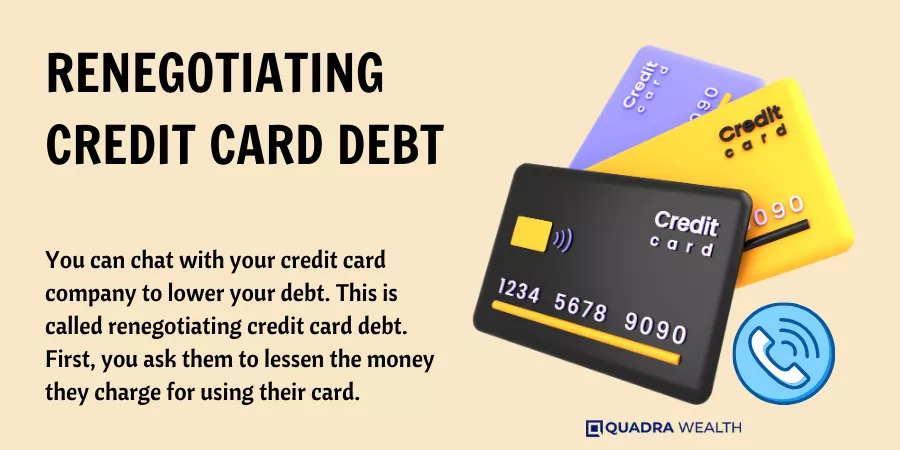
Role of Financial Advisors in Debt Management
Financial advisors can play a pivotal role in managing your debt payments. They offer expert guidance on managing your personal finances more effectively to tackle debts head-on. Finding a reliable financial advisor involves researching their credentials and looking for those affiliated with reputable bodies such as the Certified Financial Planner (CFP) or Chartered Financial Consultant (ChFC).
The National Association of Personal Financial Advisors (NAPFA) is another resource for finding trustworthy advisors. Many advisors operate on a fee-only basis, meaning they charge an agreed-upon rate rather than earning commissions from selling products — ensuring they act in your best interest.
This type of advisor is known as a fiduciary.
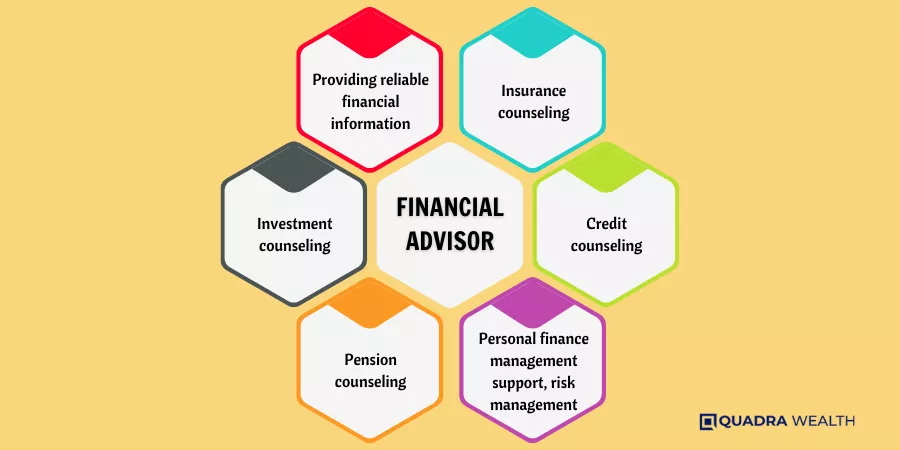
How Financial Advisors Can Help With Debt
Financial advisors can help you handle and pay off debt. They make a plan to cut down on what you owe. Advisors look at debts with high costs first. Paying these off saves money later. Hourly rates, fees, or low-cost services are ways they get paid.
A good advisor checks where your money goes and spots problems. Bring bank details, bills, loan papers, pay stubs, and tax files when you see them. An advisor uses these to know your situation better.
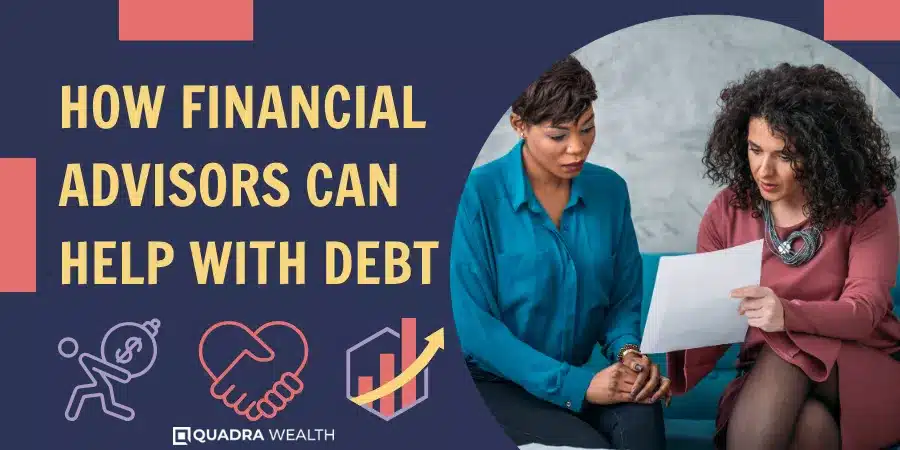
How to Find a Good Financial Advisor
Finding a good financial advisor needs some steps. Here are ways to make it easier:
- Look for solid credentials. One key sign is if they are a certified financial planner (CFP).
- Check how they get paid. Some advisors earn when you buy things, others charge fees.
- Make sure they follow the “fiduciary” rule. This rule means they must put your interests first.
- Ask about their experience with debt management.
- Find out if they have any complaints or issues on record.
- Set up a meeting to see if you feel comfortable with them.
- Be ready to show them important papers like bank statements, credit card bills, and pay stubs.
- Ask them about their plan for helping you lower your debt.
- Remember, the right advisor will help you make a plan that works for you.
How Financial Advisors Are Paid
Financial advisors provide essential services to help clients manage their debts. Their compensation for these services comes in a variety of ways. The following table outlines how financial advisors are paid.
Payment Type | Explanation |
Hourly Rates | Some financial advisors charge an hourly rate for their services. The rate usually depends on the complexity of the client’s financial situation. |
Flat Fees | Other financial advisors charge a flat fee for a specific service. For example, creating a debt management plan might have a set cost.
|
Percentage of Assets | Financial advisors may charge a fee based on a percentage of the assets they manage. This fee usually covers ongoing management and advice. |
Commission-Based | Some financial advisors earn their income from commissions on the products they sell. This could include some life insurance policies, mutual funds, or other financial products. |
Fee and Low-Cost Services | In some instances, financial advisors may offer fee-based or low-cost services, especially for simpler financial planning needs. |
It’s crucial for consumers to understand the payment structure of their financial advisors, as it impacts the cost of their services and potentially the advice they provide.
DIY Debt Management Tips
This section offers practical tips and strategies for self-managed debt control- from ceasing to borrow more money and keeping a close eye on your spending to setting up a personalized budget that will steer you toward financial freedom.
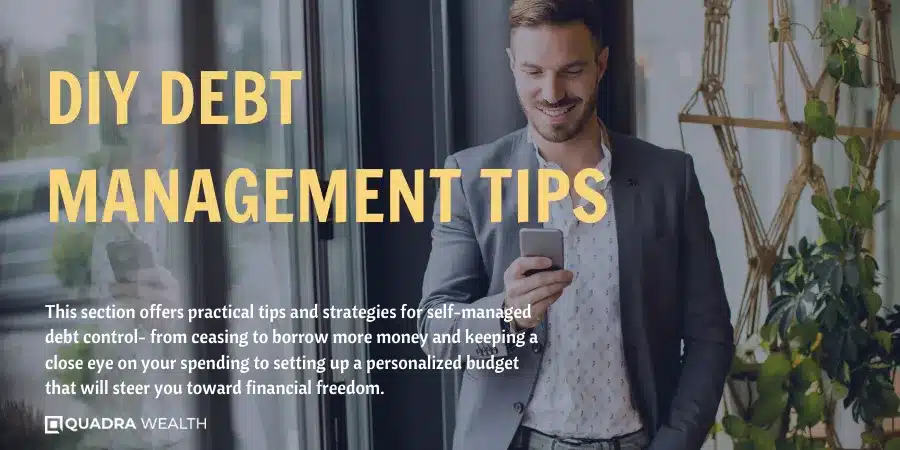
Stopping Borrowing Money
To stop borrowing money, you must start living within your means. Cut up your credit cards to avoid the urge to use them. Use cash or a debit card for all purchases. This way, if you don’t have cash on hand, you can’t buy it.
Also, mark out what needs and wants are in your life. Needs are things like food and rent, while wants are things like entertainment and clothes shopping. Focus on covering needs first before spending money on wants.
It’s an important step toward debt-free living!
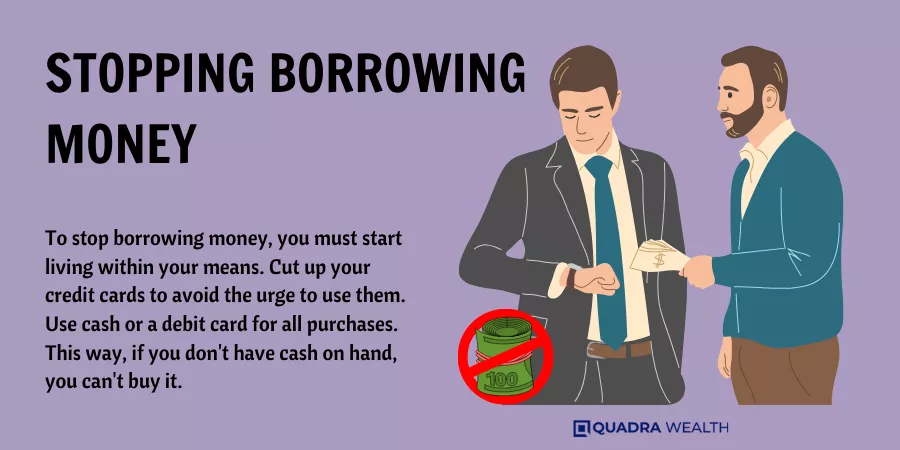
Tracking Your Spending
Let’s talk about tracking your spending. It’s a key step in getting control of your money. Here’s how:
- Keep track of every penny you spend.
- Write down all the money you put towards bills.
- Jot down all the money spent on food and drinks.
- Track other expenses like fun things or clothes too.
- Notice any patterns in your spending habits.
- Find out if you are wasting money on things you do not need.
- Look for ways to cut costs and save more money.
Setting up a Budget
To set up a budget, you need to follow a few steps. Start by knowing how much money you make each month. Include all your sources of income. Next, figure out how much you spend. Write down all your expenses like rent, food, and bills. Don’t forget to include what you owe on your debts. It’s important to list debts with the amount owed, monthly payment, and interest rate. This will help you see which debt needs attention first.
I apologize for the misunderstanding. Here are all the points in a concise format:
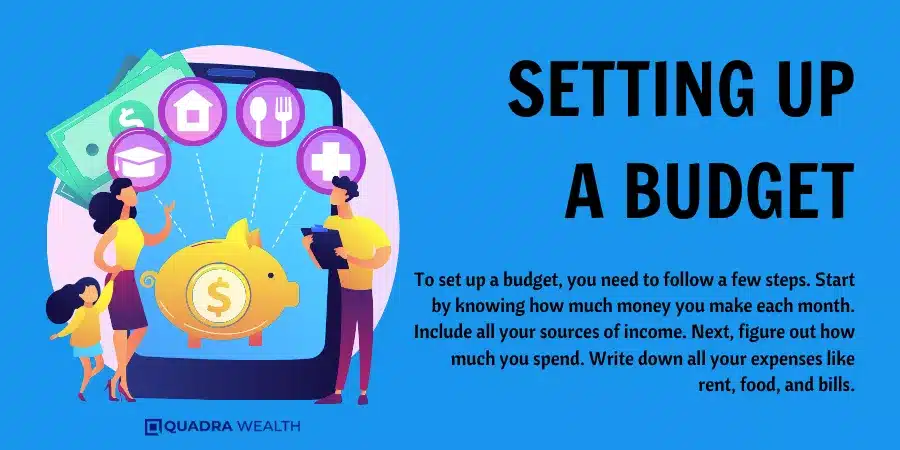
- Financial freedom
- Reduced stress
- Improved credit score
- Savings and security
- Better quality of life
- Financial stress
- High-interest costs
- Limited options
- Credit score damage
- Collection efforts
- Reduced savings and investments
- Market Timing
Conclusion
Debt can scare us. Yet, a good plan can make it go away. Ask for help if you need it. It’s never too late to start your journey towards a debt-free life! In conclusion, the path to financial freedom may seem daunting, but with the right knowledge and strategies, it’s entirely achievable.
Whether you opt for self-guided debt management or enlist the expertise of a financial advisor, the key lies in understanding your debts, formulating a long-term repayment plan, and implementing effective strategies like paying more than the minimum and exploring refinancing options.
Debt, with its potential to hinder financial goals and induce stress, can be overcome with determination and informed choices. By adhering to these principles and fostering responsible financial habits, you can pave the way towards a debt-free and financially secure future, ultimately empowering yourself to achieve lasting financial freedom.
FAQs
A long-term financial plan includes budget planning, debt reduction and payback strategies like the Debt Snowball or Debt Avalanche, and tools like a credit card payoff calculator.
Fee-only advisors, and credit counseling groups like the National Foundation for Credit Counseling (NFCC) or Financial Counseling Association of America (FCAA) can give consumers advice on avoiding scams and creating a spending plan.
If your Debt-to-Income (DTI) Ratio is high or you’re in a debt spiral by only making minimum monthly payments, that’s an alert your debts might be growing.
With good money management, payment plans suited to you, and solutions such as a debt consolidation loan or balance transfer cards could help reduce debts quicker.
Debt settlement companies may offer lump-sum settlements but it’s best to check their reputation via sources like the Federal Trade Commission first due to possible fraud risks.
This depends largely on your own situation but having emergency savings set aside for unplanned expenses while working towards your retirement savings goals is crucial too.

